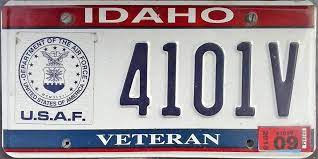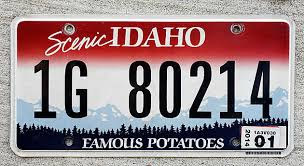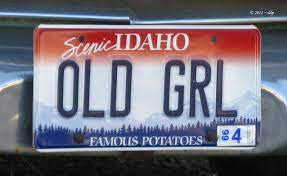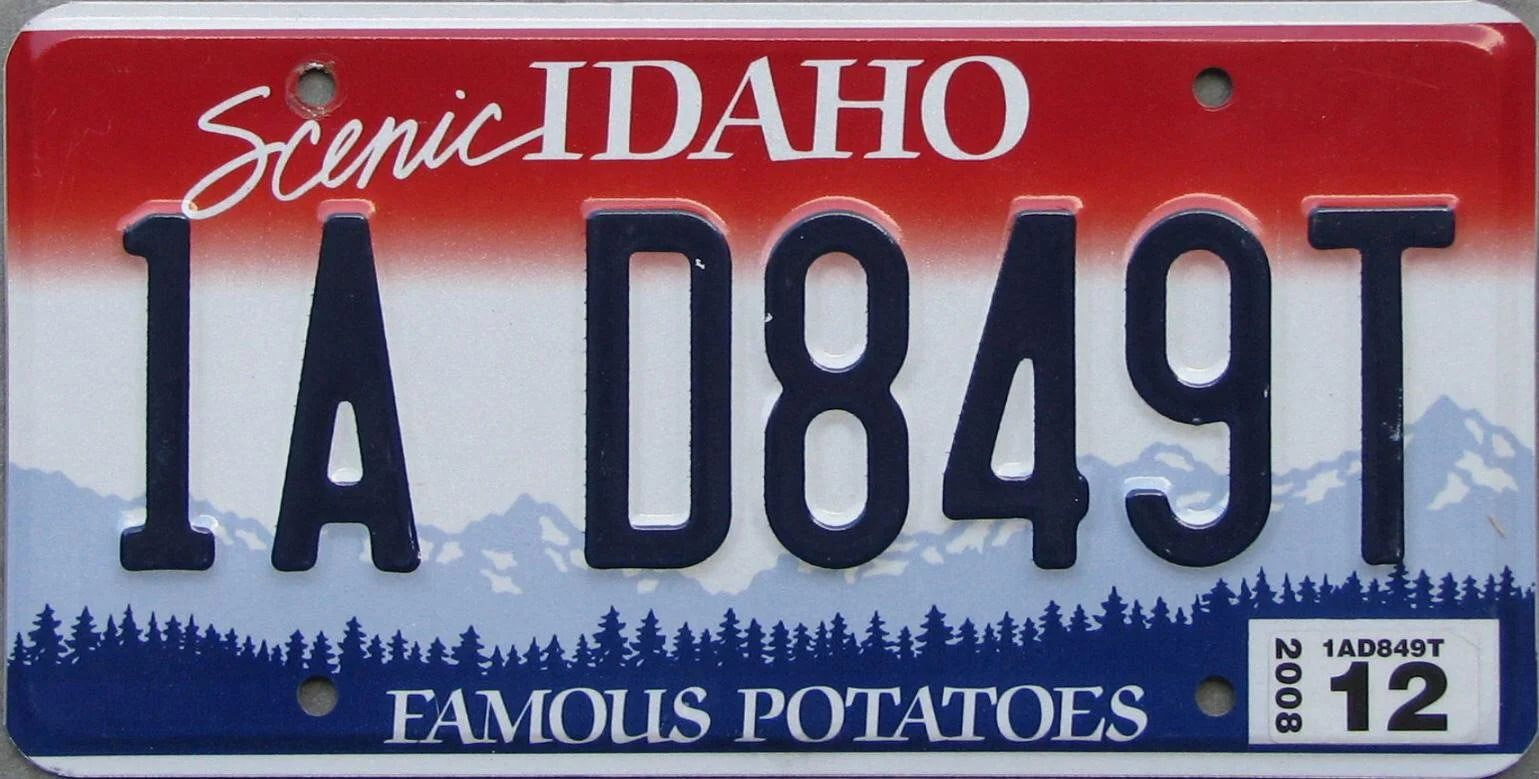 What Is a License Plate Reader and Can Police Track You Using It?
What Is a License Plate Reader and Can Police Track You Using It?
Table of Contents
- Idaho License Plate
- Idaho License Plate Design and Formats
- Idaho Vanity License Plate
- Most Popular Idaho Special Plate Numbers
- Idaho License Plate Lookup
- What Do I Need to Get a License Plate in Idaho?
- Differences Between a Passenger License Plate and Commercial License Plate in Idaho
- How To Renew License Plate in Idaho
- How To Transfer a License Plate in Idaho
- Idaho License Plate Lookup Frequently Asked Questions (FAQ)
 Idaho License Plate
Idaho License Plate
Idaho license plates are metal plates that display the registration numbers of vehicles registered in the state and serve as official identification for such motor vehicles. They help people and law enforcement to recognize vehicles involved in crashes or traffic violations quickly. Registering a motor vehicle with the Idaho Department of Transportation and obtaining license plates through the state's Division of Motor Vehicles (DMV) is mandatory.
Idaho Code, Section 49-428, requires most classes of motor vehicles to have license plates on their front and rear sides. Notable exceptions, which are allowed to use only one license plate on the rear, are:
- Motorcycles
- Utility-type vehicles
- Motorbikes
- All-terrain vehicles
- Semi-trailers
- Vehicles operated by dealers, manufacturers, and repossession agents
- Vehicles displaying the year of manufacture, classic vehicles, old-timer cars, and street rods
Idaho license plates issued to tractors can be fastened to the front. License plates are issued in different categories in the state, and they include the following:
- Standard License Plates - Idaho standard license plates are regular license plates given to residents when they register their vehicles
- Special License Plates - These are available in many varieties and themes, including the following:
- Military veterans license plates
- Special interest license plates
- Historic and custom vehicle license plates
- Organization and College license plates
- Personalized License plates - Several license plates in Idaho, including standard, special interest, and military license plates, can be personalized. You can decide what is written on your license plate when you apply for a personalized one. However, such license plates cannot bear hostile content or profane and violent language
Every resident of Idaho who has a vehicle must have it registered at their local Department of Motor Vehicles to operate their vehicle legally. The state encourages vehicle owners to register them and get license plates within 30 days of purchasing their vehicles. According to state law, every Idaho license plate must be attached securely to the vehicle to which it is registered to prevent it from swinging. License plates attached to vehicles should be at least 12 inches high from the ground level (measured from the bottom of the plates). In addition, an Idaho license plate must be affixed in a conspicuous position on a vehicle. It must be kept completely legible at all times and readable from a distance of 75 feet during daylight.
 Idaho License Plate Design and Formats
Idaho License Plate Design and Formats
A standard license plate in Idaho has a colored background of blue, white, and red mix, with "Famous Potatoes" and "Scenic Idaho" texts. Most license plates, with the exception of personalized and other special license plates, in the state have alphanumeric characters as plate numbers, usually starting with a number and followed by an alphabet.
The first numerals and alphabets on Idaho standard license plates represent the county where a vehicle is registered. They are popularly known as county license plate designators. The number stands for the county in alphabetical order. For instance, while license plates issued in Ada County start with 1A, those obtained in Adams County start with 2A. The rest of the letters and numbers on the license plates are random numbers. A standard license plate in Idaho can accommodate up to 7 alphanumeric characters, while others may contain 3 to 6, depending on the license plate type.
Standard License Plates


Special License Plates

Personalized License Plates

 Idaho Vanity License Plate
Idaho Vanity License Plate
Vanity license plates, otherwise known as personalized license plates in Idaho, are vehicle plates with imprinted personalized messages, unlike regular or standard plates. While they display custom messages, Idaho personalized license plates cannot have vulgar or obscene words. They usually have between 4 to 7 characters.
You can apply for an Idaho vanity license plate by mail, email, or online. For mail applications, you need a completed Personalized License Plates Application Form, personal identification card, and current title and registration of the vehicle (in your name). You can only use one form per vehicle. Mail the completed application form and required documents to the Idaho Transportation Department (ITD) at:
Idaho Transportation DepartmentVehicle Services - Special Plates
P.O. Box 7129
Boise, ID 83707-1129
To order an Idaho Personalized license plate online, use the state's DMV Online Services to complete your application. To use this service as a first-time user, you must create a new account. The DMV Online Services also allows you to check the availability of your preferred custom license plate number before initiating your application. For an email application, send a completed application form and other required documents to the ITD at specialplates@itd.idaho.gov. The initial application fee for an Idaho vanity license plate is $25.
 Most Popular Idaho Special Plate Numbers
Most Popular Idaho Special Plate Numbers
The following are some of the most popular themes or types of special license plates in Idaho:
- Former prisoners of war license plate
- Purple Heart recipients license plate
- Freemasons license plate
- Veterans license plate
- The Idaho Aviation Foundation license plate
- National Guard member license plate
- Military Guard member license plate
- Street Rod plates
- Idaho College and University license plate
- Support our Troops license plate
- Peace Officer Memorial license plate
- Gold Star Family license plate
- Medal of Honor license plate
- Pearl Harbor Survivor license plate
- Support Our Troops license plate
 Idaho License Plate Lookup
Idaho License Plate Lookup
Idaho license plate lookup involves checking the details of a vehicle registered in the state using its license plate number and the state's name (Idaho). Typically, these search parameters are entered into a depository of vehicle data to perform the search. In Idaho, residents can look up license plates for several reasons. License plate lookup comes in handy if you are buying a used car. For example, you can find out whether a vehicle is stolen or has been involved in any accidents by conducting a plate number search. In addition, a person can use a license plate lookup service to check a used vehicle's history and determine if it has any outstanding recalls before purchasing it.
In Idaho, a reliable plate number search website will provide information such as a vehicle's make, model, sales history, year of manufacture, market cost, registration status (active or expired), and natural damage history. Others include accident history, mileage/odometer readings, total loss records, engine capacity, repossession history, and maintenance history.
While it is possible to look up license plates in the state under the Idaho Public Record Act, such searches will only reveal certain vehicle information. Per the Federal Driver's Privacy Protection Act (DPPA), personal and identifying information of vehicle owners may only be disclosed to authorized agencies or individuals. Typically, Recordsfinder or any other third-party website will allow you to conduct an Idaho license plate lookup and find basic information about a vehicle using the plate number. You will be required to pay certain fees in order to access comprehensive information about any license plate.
Idaho Reverse License Plate Number Search
Reverse license plate number search serves the purpose of finding certain information about registered vehicles. Generally, a reverse license plate lookup in Idaho uses the full license plate number assigned to a vehicle registered in the state to search for other information about the car.
If you are authorized to search license plates, you can use Recordsfinder to perform a reverse license plate number search on any Idaho-registered vehicle. You must state why you are interested in looking up information about the vehicle and the reason must be for a DPPA-compliant purpose. A reverse license plate number search may not be processed if the reason selected for conducting it contravenes any of the DPPA-allowable reasons. Generally, Idaho's Driver Privacy Protection Law aligns with the federal DPPA and strictly prohibits looking up license plate numbers for reasons that violate the DPPA.
 What Do I Need to Get a License Plate in Idaho?
What Do I Need to Get a License Plate in Idaho?
You must apply to the state's Transportation Department (ITD) for a vehicle registration to secure a license plate in Idaho. The requirements for registering a vehicle in the state depend on whether the car was purchased from a dealership or a private party. After submitting your vehicle registration application, your vehicle registration documents and license plates should arrive in the mail within 4 to 8 weeks. Generally, car dealers handle the paperwork for individuals or businesses that purchase vehicles from dealerships in Idaho by submitting the registration documents and vehicle titles to the ITD.
New residents of Idaho must have their vehicles registered with the ITD within 90 days of establishing residency in the state. Once residency is established, they can visit their local county Department of Motor Vehicles (DMV) office and submit the following to register their vehicles and get Idaho license plates:
- Proof of Idaho residency
- Current out-of-state vehicle registration
- Completed Vehicle Identification Number (VIN) Inspection Certification (Form ITD 3403) - VIN inspection costs $5
- Driver's license and SSN (social security number)
- Payment for all required registration fees - The annual registration cost primarily depends on the vehicle type (or weight), county of residence, vehicle age, and inspection requirements. Vehicle owners can choose to register their cars for 1 or 2 years (payment for 2 years is double the annual cost)
If you purchased your vehicle from a private party in Idaho, then you must title it within 30 days after the purchase date before applying for vehicle registration, hence license plates. You can title your new vehicle at the local county DMV office by providing the following documents:
- A valid Idaho driver's license or any order state-issued valid ID
- A completed Form ITD 3404 (payment of $5 for inspection fee applies)
- Proof of valid Idaho insurance
- A completed Form ITD 3337 (Application for Certificate of Title)
- An odometer reading for motor vehicles under 16,000 lbs and under 10 years
- Payment of $14 for the vehicle's title fee and 6% sales tax (sales tax may vary depending on when the vehicle was purchased and whether it was bought out-of-state or in Idaho)
Once you obtain the vehicle's title bearing your name, provide the following at the local DMV office to register the car and obtain license plates:
- A valid ID card or Idaho driver's license
- The vehicle's title (Sign the title if sending someone to do the vehicle registration on your behalf)
- Payment of the required fees (the amount depends on the vehicle type (or weight), county of residence, vehicle age, and inspection requirements, and you can choose to register it for 1 or 2 years)
You can find the contact address and phone number of your local county DMV office on the ITD website. Some counties require you to schedule an appointment before visiting.
 Differences Between a Passenger License Plate and Commercial License Plate in Idaho
Differences Between a Passenger License Plate and Commercial License Plate in Idaho
Passenger license plates are used on passenger vehicles, while commercial license plates identify vehicles that are used or owned for commercial purposes. Passenger license plates are usually issued to privately owned and operated vehicles. On the other hand, commercial plates are mostly obtained for vehicles used for business operations or owned by commercial entities. The major differences between commercial license plates and passenger license plates in Idaho are outlined in the table below:
| Criteria | Passenger License Plate | Commercial License Plate |
|---|---|---|
| Vehicle Weight | Issued for with a maximum gross weight of 8,000 lbs | Issued for vehicles weighing between 8,001 lbs and 26,000 lbs |
| Vehicle Type | Goes on vehicles like pickup trucks, sedan cars, and electric vehicles | Affixed to vehicles like trailers and other motor vehicles used to transport hazardous materials or designed to carry at least 16 passengers |
| Registration Process | Issued by the local county DMVs | Can be issued by the local county DMVs or through Motor Carrier Services |
To obtain a passenger license plate in Idaho, the vehicle must be owned by an Idaho business or resident and must be titled before it is registered. Similarly, to secure a commercial license plate for any vehicle in the state, the vehicle owner must be based in Idaho and must register the vehicle with the Motor Carrier Services. Depending on your vehicle type, you can contact the IDT or your local county DMV for information on the specific requirements for obtaining either license plate.
 How To Renew License Plate in Idaho
How To Renew License Plate in Idaho
Renewing a license plate in Idaho implies renewing a vehicle registration. Vehicle registrations in the state can be valid for one or two years, depending on the option chosen during the initial registration. Idaho law requires vehicle owners to renew their vehicle registrations/license plates at the state's Transportation Department (ITD) once they expire.
Most vehicle registrations in Idaho can be renewed online using the ITD-DMV Online Services. First-time users will need to create new accounts to be able to access the DMV's online vehicle registration renewal services. Typically, the system guides users through the renewal application process. Before initiating the process, make sure to have a credit/debit card (for payment), license plate number, and your valid Idaho driver's license or ID handy.
You can also complete your vehicle registration renewal application in person in Idaho by visiting your local county DMV office. The attending employee will guide you through the process. An in-person Idaho vehicle renewal application requires the following:
- An Idaho driver's license or any other valid ID card
- Proof of Idaho residency
- Registration renewal postcard
- The last six characters of your VIN (vehicle identification number)
- Vehicle plate number
Some local county DMVs also permit vehicle registration renewal by phone. All it takes is to contact their call center, provide the clerk with your license plate number requiring renewal, and provide your credit/debit card number and the card's expiration date. After verifying some vital information, the clerk will process the transaction. Your processed renewal registration will arrive in the mail, or you can pick it up at the county DMV office.
The cost of renewing a vehicle registration in Idaho differs and largely depends on how old a vehicle is. Depending on the county, additional fees may also apply, considering the variations in county taxes and administrative fees. Generally, it costs $69 to renew a vehicle that is 1 to 2 years old, $57 for a car between 3 and 6 years old, and $45 for any motor vehicle that is at least 7 years old.
 How To Transfer a License Plate in Idaho
How To Transfer a License Plate in Idaho
An Idaho license plate belongs to the vehicle owner and can be transferred from their old vehicle to a new one. The only exceptions are the black and white vehicle restricted plates. To transfer your license plate to another vehicle belonging to you in Idaho, visit your local county DMV office with your license plate number and pay the required fee. If the vehicle you intend to transfer the license plate to is brand new, then you need to provide the pink copy of the vehicle title application submitted to the DMV by the dealership.
 Idaho License Plate Lookup Frequently Asked Questions (FAQ)
Idaho License Plate Lookup Frequently Asked Questions (FAQ)
Can I Find the Owner of a License Plate in Idaho?
Only authorized individuals and entities with valid, allowable purposes and suitable documentation can look up vehicle owners' personal (identifying) information through their Idaho license plates. The state Driver's Privacy Protection Policy agrees with the federal DPPA. Consequently, except as otherwise provided, the policy prohibits the DMV or its employees from knowingly disclosing personal details about anyone when such information was fetched from a driver record or a vehicle. In other words, you must secure approval and provide proper documentation explaining why you need a person's identifying information through license plate lookup.
If authorized, you can find the owner of an Idaho license plate using the state's Driver License Record (DLR) Search Portal. Otherwise, anyone with a genuine and legal reason to look up the license plate owner in the state should contact law enforcement. Law enforcement agencies are legally authorized to search vehicle record databases and can obtain personally identifiable information for legal purposes. Alternatively, you can search a license plate to find basic information on a registered vehicle in the state (excluding the vehicle owner's identifying information) using Recordsfinder. In the United States, vehicle license plate numbers are linked to their VINs in public records, and the records of over 269 million such registered vehicles can be obtained by looking up their license plates.
Can I Get a Replacement for My Lost License Plate in Idaho?
You can order a replacement license in Idaho using the DMV Online Services. However, you will need to create an account if you do not have one already before you can initiate the order. The system prompts will guide you through the ordering process. Submit your request after providing all the required information and/or uploading the necessary documentation. Alternatively, you can visit your county DMV office with your vehicle registration certificate to obtain a replacement Idaho license plate. Staff at the DMV office will guide you through the application process. It costs $3.75 to replace a license plate in the state.
What Do Police See When They Run Your License Plates in Idaho?
In Idaho, police run license plates if they suspect something is weird with a vehicle or its driver and for routine verification and can find a range of information, including the following:
- Vehicle registration status
- Alerts for a stolen vehicle
- Information about the registered owner
- Outstanding violations
- Insurance verification
- Warrants and investigations associated with the vehicle/owner
Can I Search License Plates for free in Idaho?
Yes. Several online resources, including those run by third-party websites, provide free license plate lookup services for vehicles registered in Idaho. In most cases, people do free license plate lookups to get a vehicle history when considering purchasing a used car. Any information unveiled during the search can influence their decision on the intended purchase. Relying only on the information provided to you about a used car can sometimes be misleading. It is best to conduct a free license plate search to prevent making a wrong purchase when acquiring a used car in Idaho.
You can trust the license plate lookup services offered by Recordsfinder to return accurate reports/information on any vehicle registered in Idaho. In many cases, and depending on what you want, the search results may contain some of the following information:
- Vehicle manufacture year
- Model
- Tank size
- Engine type
- Current market value
What is the Penalty for Driving with An Expired License Plate in Idaho?
Depending on the validity period chosen during the initial registration, an Idaho vehicle registration/license plate expires after one or two years after issuance. Failing to renew a vehicle registration after expiration is an offense, as the state has zero tolerance for operating a vehicle with an expired registration. Typically, an offender risks paying a $44.50 fine and may be incarcerated for up to 72 hours until they pay their vehicle registration renewal fees. In addition to the fixed penalty, offenders may be required to pay a $10 court technology fund fee, $16.5 in court costs, a $10 emergency surcharge fee, a $5 county justice fund fee, and a $15 peace officers training fee. Per state law, If an Idaho license plate number expires and is not renewed within 60 days of expiration, it will be available for use by another vehicle owner.
Temporary license plates in Idaho are only valid for 30 days and are not substitutes for permanent vehicle registrations. It is important for a vehicle owner to complete their permanent registration within this period to avoid any penalty associated with operating a vehicle with an expired license plate.
Do I Need to Return License Plates in Idaho?
No Idaho law mandates vehicle owners to surrender their license plates when they sell their cars or relocate out of state. Generally, license plates are considered vehicle owners' property. This means the plates can stay with them when they trade their vehicles without necessarily returning them to the Idaho Transportation Department (ITD). However, if you no longer need your license plates, for instance, if you move out of Idaho to settle in another state, they might be of no use, and you can return them to the local DMV office.
If you are relocating out-of-state and wish to return your Idaho license plate, complete the License Plate Cancellation Request Form and select "moved out-of-state" as your reason for seeking to cancel it. Submit the completed form to the ITD by email or in person at your county DMV office. Alternatively, you can mail it to the ITD at:
Idaho Transportation DepartmentVehicle Services/Special Plates
P.O. Box 7129
Boise, ID 83707-1129
Can I Keep my Idaho License Plate if I Move to Another State?
While Idaho will not penalize you for not returning your license plates when you move permanently to another state, you will be required to change your license plates in your new state. Generally, license plates obtained in Idaho are the owners' property, and they can keep them wherever they go. However, license plates are only valid for 10 years after the issuance date in the state, and at the end of the 9th year, the owner will be notified of the impending expiration.
What Size are License Plates in Idaho?
The size of a standard license plate issued to passenger vehicles, commercial vehicles, trailers, and regular automobiles in Idaho is 12" x 6". On the other hand, motorcycle license plates typically measure 7" x 4".
How Long Can You Drive with Temporary License Plates in Idaho?
The rules governing temporary vehicle registration in Idaho apply primarily to new vehicle owners and out-of-state residents buying Idaho vehicles. Under these rules, individuals who cannot immediately complete their vehicle registrations can obtain temporary registration permits from the ITD or vehicle dealers in the state. Similarly, out-of-state purchasers who are transferring their newly bought cars to their state of residence can obtain temporary license plates from the ITD. However, as the name implies, such permits are not permanent and are only valid for 30 days. The rules made exemptions for trailers, recreational vehicles (RVs), and special make equipment.
What Are the Steps to Renew License Plates in Idaho?
You can renew your Idaho license plates using any of the following methods:
- Online using the DMV Online Services
- Create an account if a first-time user
- Fill out the online form. You will need your license plate number, driver's license, and a debit/credit card for payment
- Submit the form
- By Phone
- Call your county DMV's call center
- Provide the necessary information, including your license plate number
- Provide your debit/credit card number and expiration date to process the renewal fee
- Upon verification, the DMV clerk will process the transaction
- Wait for your renewal registration to be processed and sent to you by mail
- In Person at your County DMV office
- Visit the county DMV office where your vehicle was registered
- Provide the required documentation, including proof of residency, driver's license, the last six digits of your VIN, plate number, and registration renewal postcard
What Do I Do If My License Plate is Lost or Stolen in Idaho?
- File a report with the police. While this is not mandatory in Idaho, you can do it to avoid identity theft and misuse of stolen or lost license plate
- Visit your county DMV office to request a replacement license plate
- At the DMV office, write and sign a statement about the situation and explain why you need to replace your license plate
- Alternatively, request a replacement Idaho license plate using the DMV Online Services
- Pay a $3.75 license plate replacement fee ($7.50 if replacing two license plates)
 Related Articles
Related Articles
The information on this website is taken from records made available by state and local law enforcement departments, courts, city and town halls, and other public and private sources. You may be shocked by the information found in your search reports. Please search responsibly.
Recordsfinder.com is not a “consumer reporting agency” and does not supply “consumer reports” as those terms are defined by the Fair Credit Reporting Act (FCRA). Pursuant to our Terms of Service and Privacy Policy, you acknowledge and agree not to use any information gathered through Recordsfinder.com for any purpose under the FCRA, including but not limited to evaluating eligibility for personal credit, insurance, employment, or tenancy.
Searches of license plate and VIN information are available only for purposes authorized by the Driver’s Privacy Protection Act of 1994 (DPPA).
By clicking “I Agree” you consent to our Terms of Service, agree not to use the information provided by Recordsfinder.com for any unlawful purposes, and you understand that we cannot confirm that information provided below is accurate or complete.
The search you are about to conduct on this website is a people search to find initial results of the search subject. You understand that any search reports offered from this website will only be generated with the purchase of the report or account registration.



